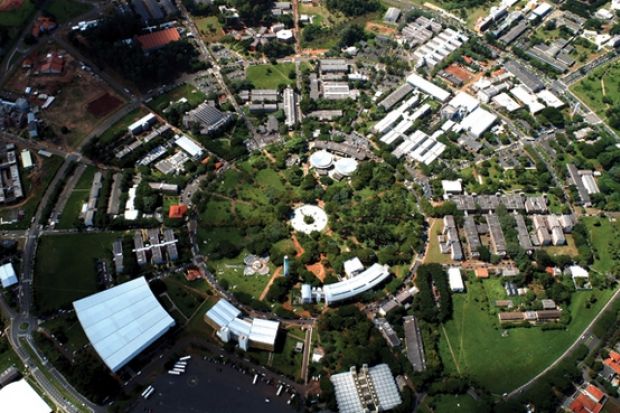The State University of Campinas (Unicamp) is on an upwards trajectory: it was part of the 6-300 band in the most recent Times Higher Education World University Rankings; 98 per cent of its 1,900 faculty have PhDs (and more than 90 per cent of them are full time); its graduate programme has earned the highest mean score of all Brazilian universities under the federal system of assessment; it grants about 800 doctorate and 1,200 master's degrees a year; and it generates about 8 per cent of Brazil's published papers in indexed journals (about 2,800 a year), making it the most productive of the country's institutions when scaled for size.
Furthermore, Unicamp's undergraduate admissions system is the most selective among Brazil's comprehensive universities: it receives about 18 applicants for each place.
So what's its story? In 1965, Zeferino Vaz, who had established one of the University of São Paulo's medical schools, was tasked with establishing a research university in Campinas. Vaz served as Unicamp's first rector from 1966 to 1978 and succeeded in attracting leading Brazilian intellectuals and scientists to the fledgling institution, as well as scholars from abroad - some fleeing harsher political conditions in countries such as Chile and Argentina.
When Vaz retired in 1978, the university was plunged into a crisis triggered by an attempt by Paulo Maluf, São Paulo's state governor, to unilaterally choose its next president. Overcoming this threat helped to forge a distinct identity for the campus community: Unicamp's excessively centralised administrative system was reformed, leading to the more inclusive, process-oriented system of governance in place today.
At the end of the 1980s, a long era of labour and budgetary conflicts with the state of São Paulo drew to a close. In 1989, after protracted negotiations, the State Assembly approved legislation that gave São Paulo's universities broad autonomy. Each institution was assigned a fixed proportion of the state's net value-added tax revenue as its public budget (Unicamp's share today is just under 2.2 per cent).
Faculty and staff wages, as well as retired employees, became the responsibility of the universities under the arrangement. This allowed Unicamp to take control of its own strategic planning and to decide where and how it spent its money.
Within a couple of years of the autonomy decree, Unicamp started its so-called "Quality Project", which required full-time faculty without a PhD to complete one within a given time frame and stipulated that all incoming faculty should also meet the requirement. These rules are still in place.
Finally, a self-assessment system was developed. One of its components was a periodic individual report that each faculty member (even those with tenure) had to prepare, and which has been used to assess performance in teaching, research and outreach activities. This also remains in place.
Unicamp quickly distinguished itself as one of the best institutions in Brazil, leading the way in terms of research, graduate programmes, even access to undergraduate courses. Enrolment (undergraduate and graduate) has more than doubled since 1989 and the number of indexed journal articles has multiplied by a factor of 10.
Highly selective hiring and admissions policies have helped to build a well-qualified campus community, essential for Unicamp's continuing success as a centre of excellence in teaching and research.
Of course, if Unicamp intends to climb additional steps on the competitive global higher education ladder, new challenges will present themselves.
For example, a governance system based on strict public statutes - determining how academics are hired and how much they are paid - may hinder Unicamp's ability to pursue a more aggressive agenda internationally. One of its main challenges will be to increase the global impact of its research in all areas of knowledge while maintaining the quality of its teaching in undergraduate and graduate programmes.
Many industrialised and emerging economies are developing strategies to address the same issues as Brazil. How the country's university leadership responds to those challenges will determine how and whether Brazil (and Unicamp) will move forward and at what speed.
Register to continue
Why register?
- Registration is free and only takes a moment
- Once registered, you can read 3 articles a month
- Sign up for our newsletter
Subscribe
Or subscribe for unlimited access to:
- Unlimited access to news, views, insights & reviews
- Digital editions
- Digital access to THE’s university and college rankings analysis
Already registered or a current subscriber? Login
